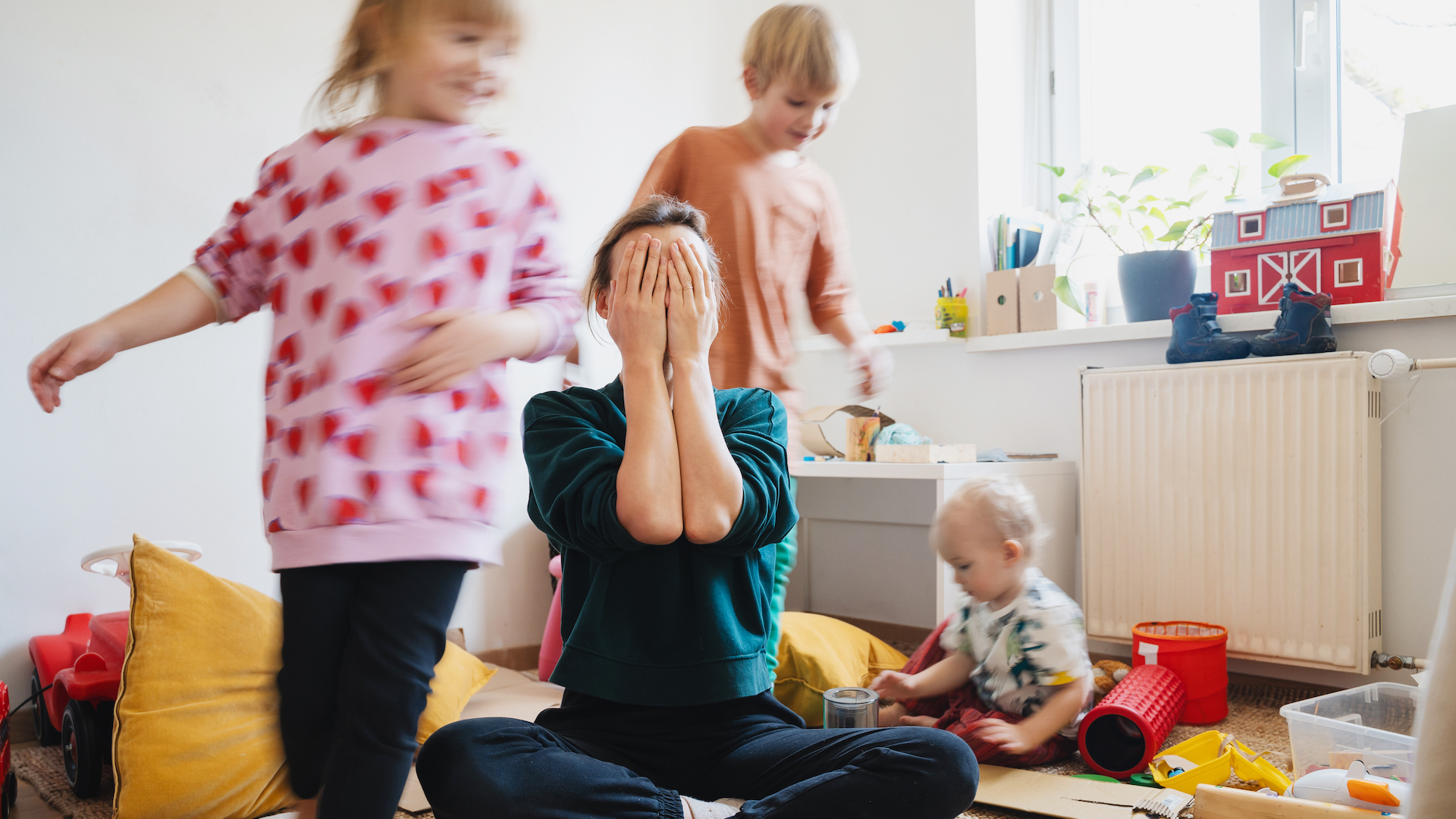If you’ve been on ParentingTok lately — or just, like, silently rage-scrolling while your kid screams over the wrong color cup and you mutter “looks like you’re having big feelings” on loop — you’ve probably stumbled across the term FAFO parenting. Short for “fuck around and find out,” it sounds like something a frat guy yells before getting kicked out of a bar (RIP Chad), but somehow, it’s entered the parenting lexicon and is actually being taken seriously by people who write think pieces (it’s me) and have degrees in child development (not me).
“FAFO parenting is generally characterized by letting children experience natural consequences with minimal parental intervention,” certified coach and founder of Transforming Toddlerhood, Devon Kuntzman, tells Betches.
Granted, I initially assumed the phrase was aimed at parents. Because honestly? Most of us are just fucking around and finding out on a daily basis: testing new parenting approaches like they’re skincare serums, saving gentle parenting scripts we never remember to use, and Googling “how to handle bedtime refusal without fucking my kid up” at 1 a.m. It’s giving chaos. It’s giving trial and error. It’s giving “this is fine everything’s fine” while your color-coded smart calendar goes up in metaphorical flames because your kid’s banana broke in half and now they’re howling like a wounded animal and refusing to put on shoes, so you’re going to be late to the pediatric dentist appointment you booked months ago, which means you’ll have to reschedule it, and maybe you should’ve just stayed child-free and moved to Europe as a DINK???
But no. FAFO parenting is aimed at the kiddos. Specifically, the feral ones who’ve been lovingly warned 17 times not to throw their snack bowl again, only to launch it like a discus the second you blink. It’s not a parenting philosophy per se, but it is a mentality. One that says, “You didn’t listen? Cool. Guess you’ll find out.”
Whether it’s a reaction to gentle parenting burnout, a TikTok trend, or just another label slapped on survival mode, FAFO parenting is having its moment. So let’s fuck around and find out if this new POV will mess up our kids, save our sanity, or a little bit of both.
What Is FAFO Parenting?

Quick recap in case you didn’t have time to read the intro (respect): FAFO parenting stands for “fuck around and find out,” and in the parenting world, it’s basically letting your kid experience the natural consequences of their actions, with minimal sugarcoating on your end. You tell them not to do something, they do it anyway, and instead of rushing to rescue or over-explain, you let the fallout speak for itself. It’s cause and effect. It’s learning by doing. It’s “I already warned you, so… enjoy.”
It’s not a formal parenting method, but more of a mindset — one that usually kicks in when gentle parenting has stopped working (or, let’s be honest, *never* worked for your specific breed of gremlin).
FAFO parenting isn’t about being cold or punitive. It’s about knowing your limits. You still care, obviously. You’re just not interested in narrating a TED Talk about feelings every time someone throws a snack cup. It’s “I love you” and “I’m not explaining this again.”
Basically, if gentle parenting is about collaboration, FAFO is about clarity. You set the boundary, you hold it, and when your kid inevitably tests it… they find out.
Is FAFO Just… Bad Parenting?
Depends on who you ask. To some people — especially those deep in gentle parenting TikTok or still claiming their toddler has never personally victimized them — FAFO parenting sounds like a cop-out. And sure, if your entire approach is just yelling “fuck around and find out, loser” from the couch while your kid eats glue, then… yeah, that’s probably not ideal.
But for a lot of parents, FAFO isn’t about giving up; it’s about stepping back. Instead of controlling every meltdown or micromanaging every outcome, you let the natural consequences do the teaching. You don’t swoop in with a Pinterest-ready solution. You don’t launch into a TED Talk about emotional regulation. You just… pause. Let the moment play out. And hope the lesson lands.
It’s not hands-off exactly, but it’s also not curated, calm, or particularly Instagram-friendly. For some people, that’s a red flag. For others, it’s survival.
Kuntzman notes that FAFO moments can have value, but only when paired with empathy and support. “When this approach is overused or done without guidance, it can cause real challenges,” she says. “A shaming or ‘told you so’ tone, unsafe situations, or skipping the teaching piece can lead to mistrust, missed skill-building, anxiety, or avoidance.”
The concept itself, though, isn’t exactly new. As Dr. Melissa Giglio, a clinical child psychologist and founder of Brave Mighty Minds, puts it: “This is a page torn out of the late Baby Boomers to Gen X parenting handbook. It’s parenting that relies on consequences — many natural and some imposed by surrounding adults or authorities. It’s the opposite of helicopter parenting, where obstacles are removed and children are ‘bubble-wrapped’ from emotional, psychological, or physical distress.”
How to Implement FAFO Parenting
There’s no official handbook for FAFO parenting — yet. But give it a week, and some momfluencer will definitely drop a pastel-colored PDF called Boundaries Are the New Brunch, complete with a companion TikTok dance you’ll try to learn during naptime and immediately forget by dinner. Maybe she’ll even say she wrote it herself, but we all know ChatGPT carried that collab.
Anyway. FAFO parenting in its current form is refreshingly low-lift. You set a boundary, give a consequence, and then actually follow through (without the long-winded explanation, internal guilt spiral, or fake zenergy that makes your eye twitch).
Here’s what FAFO parenting looks like:
- They roll their eyes and say they don’t want dinner. You say, “Cool, this is the only thing I’m making.” Later, they ask for a snack and you hit ’em with the classic: “Kitchen’s closed, my dude.”
- Your kid insists they’re not cold even though it’s 50 degrees out. You shrug, they freeze their tiny ass off at recess, and suddenly that jacket doesn’t seem so offensive.
- You say, “If you want to go outside, you need shoes.” They say no. You let them stand barefoot at the door like a tiny Victorian ghost while their sibling runs off living their best life.
- They forget their backpack after you remind them twice. You do not drive it over. They miss show-and-tell and spend the rest of the day whining about it. Consequences? We love to see it.
And here’s what FAFO is not:
- Letting your kid touch the stove to “learn their lesson.” That’s called negligence, fam.
- Ignoring them when they’re clearly overwhelmed or dysregulated. FAFO isn’t “figure it out alone,” it’s “I already told you the outcome and now you’re experiencing it.”
- Punishing them out of spite. You’re not hiding their shoes because they annoyed you; you’re letting a natural consequence unfold, not creating one to prove a point.
- Being emotionally cold. You can still empathize while staying firm. “Yeah, that sucks. You can try again tomorrow.”
- Punitive. It’s just… parenting without over-functioning. You’re not being the bad guy. You’re just being the emotionally depleted shell of a person who already explained this three times and would now like to sip her coffee in peace. Respectfully.
That said, this isn’t a one-size-fits-all method. “The younger a child is, the less brain maturation and life experience they have,” says Kuntzman. “Leaving a child to ‘figure it out’ too soon can create fear, shame, and mistrust rather than growth. If you choose to use natural consequences, make sure they happen within a supportive environment. Rather than thinking of FAFO as a ‘sink or swim’ approach, picture it as wading in the pool with a lifeguard nearby.”
Giglio agrees, emphasizing that extremes in either direction rarely work. “Any parenting practice in extremes will be short-lived and ultimately ineffective,” she says. “Parenting needs to be flexible while adhering to family values and goals to develop independent, bright, and successful adults.”
Is FAFO Parenting Right for Me?
If you’ve ever said, “Fine, don’t wear the jacket,” or “Maybe you’ll remember your backpack tomorrow,” congratulations — you’re already dabbling in FAFO parenting, whether you meant to or not.
At its core, FAFO is about doing less without completely giving up. It’s setting boundaries without making a PowerPoint about them. It’s letting your kid learn the hard way sometimes, so you don’t have to lose your GD mind all the time.
But honestly? I think I was right from the start: FAFO parenting isn’t just for the kids. It’s for us. Because while our children are learning not to jump off the couch in Crocs, we’re the ones actually fucking around and finding out — on every single level. Trying new approaches. Reading half of a parenting book (or asking AI for the TL;DR). Copying some TikTok mom’s bedtime chart and immediately forgetting it exists.
So if you’ve ever Googled “how to get my kid to stop licking the dog” at 2 a.m., FAFO is probably right for you. But if you say “eff around and find out” or use asterisks instead of actually using the word “fuck”? This is probbbbably not your parenting style.
FAFO parenting: not new, not perfect, but it’s finally getting the rebrand it deserves. Whether you’ve been doing it all along or just realized gentle parenting 24/7 makes you want to rip your own skin off — welcome. We’ve got coffee. It’s probably cold.




















































